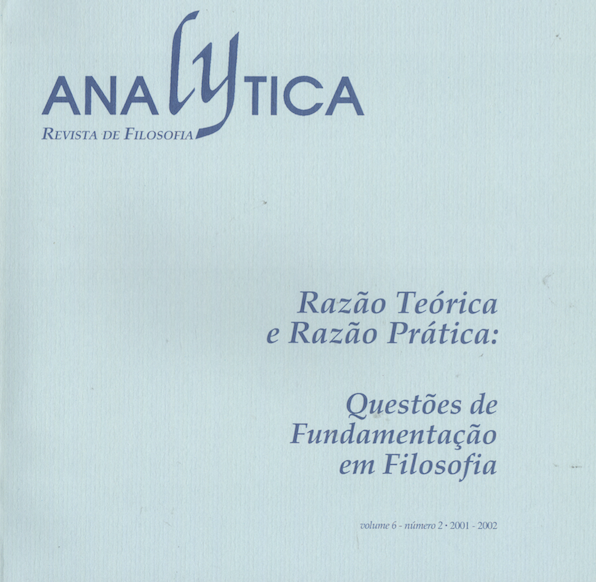Referência e juízo em Kant
Resumo
Neste trabalho discuto a conexão entre os dois principais conceitos da filosofia teórica de Kant: intuições e juízos. Enquanto o primeiro é definido ora como representação singular ora como representação imediata, o segundo é apresentado como uma representação mediata, ou seja, uma representação que se refere a objetos apenas mediante outras representações. Nestes termos, o máximo que podemos afirmar é que juízos se conectam a intuições na medida em que se referem a objetos imediatamente referidos por intuições. A partir do Bounds of Sense de Strawson, surge uma interpretação precisa da conexão entre intuições e juízos, segundo a qual a noção kantiana de intuição passa a ser compreendida como o correlato epistêmico da função subsentencial desempenhada pelas expressões dêiticas como termos singulares em proposições atômicas. Essa interpretação possibilitou uma reconstrução sistemática da filosofia teórica de Kant a partir de teses semânticas e epistemológicas bem conhecidas, dentre as mais importantes seriam: uma forma elementar de verificacionismo e uma forma de fundacionismo epistêmico. Neste trabalho, defenderei as seguintes teses. Em primeiro lugar, tentarei mostrar que intuições não podem ser entendidas como o correlato epistêmico dos termos singulares. Proponho interpretá-las como uma forma prélingüística de consciências através da qual objetos são discriminados no espaço e no tempo. Buscarei assinalar que não há base textual tampouco para a interpretação de Strawson do juízo singular em Kant como uma proposição semanticamente atômica. Uma vez que concebe todo juízo categórico (inclusive os singulares) como uma relação entre conceitos, ambos desempenhando uma função predicativa no juízo, sugiro a seguinte interpretação: o juízo categórico será verdadeiro quando as notas características do conceito predicado se aplicarem àquelas mesmas entidades, discriminadas pré-lingüisticamente pelas intuições, às quais as notas características do conceito sujeito também se aplicam.
Abstract
This paper discusses the connection between the two main concepts of Kant's theoretical philosophy: intuition and judgement. While the first is defined either as a singular representation or as an immediate representation, the second is presented as a mediate representation, viz, as representation that refers to an object only by means of other representations. In these terms, the best we can say is that a judgement connects itself to intuitions sofar as it refers mediately to an object immediatly referred by an intuition. Since Strawson's Bounds of Sense a precise picture of the connection between intuitions and judgements has emerged, according to which Kant's concept of intuition should be understood as the epistemic correlate of the subsentencial function played by indexicals as singular terms in atomic sentences. This impressive picture gives birth to a sistematic interpretation of Kant's philosophy in terms of well-known semantical and epistemological thesis, the most important of them being both a form of verificationismus and a fundacionalist conception of epistemic justification. In this paper, I'll argue for the following thesis. First of all, I'll try to show that intuitions cannot be understood as the epistemic correlate of the subsentencial function in an atomic sentence played by indexicals. I propose that they should be construed as a prelinguistic form of awareness through wich objets are discriminated in space and time. However, there is also no textual basis for Strawson's interpretation of Kant's singular judgement as the atomic sentence either. Since Kant considers that every categorical judgement (including the singular one) expresses a connection between concepts, both playing a predicative role in judgement, I suggest the following interpretation: categorical judgement is true whenever the notes of the concept of the predicate are true of the very same objects, discriminated prelinguistically through intuitions, of which the notes of the concept of the subject are also true.
Downloads
Downloads
Publicado
Como Citar
Edição
Seção
Licença
Os autores que publicam nesta revista concordam com os seguintes termos:
- Os autores mantêm os direitos autorais e concedem à revista o direito de primeira publicação, com o trabalho simultaneamente licenciado sob a Licença Creative Commons Atribuição-SemDerivações 4.0 Internacional (CC BY-ND 4.0), que permite a redistribuição, comercial ou não comercial, desde que a obra original não seja modificada e que seja atribuído o crédito ao autor.
- Os autores têm autorização para assumir contratos adicionais separadamente para distribuição não-exclusiva da versão do trabalho publicada nesta revista (ex.: publicar em repositório institucional ou como capítulo de livro), com reconhecimento de autoria e publicação inicial nesta revista.
- Os autores têm permissão e são estimulados a publicar e distribuir seu trabalho online (ex.: em repositórios institucionais ou na sua página pessoal) a qualquer ponto antes ou durante o processo editorial, já que isso pode gerar alterações produtivas, bem como aumentar o impacto e a citação do trabalho publicado (Veja O Efeito do Acesso Livre).


